Memorial Prayers for the late Lord Leicester
On 7 June Memorial Prayers for the repose of the late Earl of Leicester were held following the Divine Liturgy at Babingley in the presence of the present Earl, his mother (Valeria, Viscountess Coke), and other members of the Coke family, who also attended the Divine Liturgy, which Abba Seraphim celebrated. The 7th Earl, who died at the end of April, was a leading figure in Norfolk life and had devoted many years to the restoration and modernisation of his ancestral estates at Holkham. Lady Coke has long been a good friend of the Orthodox community at Babingley and values the Orthodox tradition of forty days of mourning and prayers for the departed.
Portsmouth Baptisms
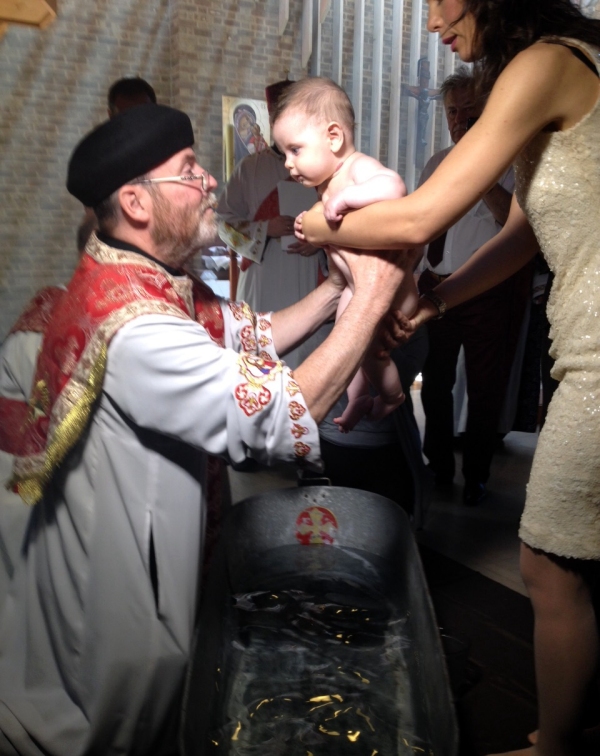
During the celebration of the Divine Liturgy in the Church of Saint Mary the Mother of God and Saint Moses the Black, Portsmouth, on Saturday 6, June, five new members of the faithful were received by baptism and chrismation; one adult, two children and two infants. Rebecca Cole who has been gently, thoughtfully and prayerfully working her way towards Orthodoxy for the past eighteen months and was recently received into the catechumenate was sponsored by Annamarie Ewing who had earlier followed a similar gentle path into Orthodoxy. As Annamarie could not be present yesterday she was represented by Tasony Sheila Smyth who assisted with Rebecca’s robing in white after her baptism. Sisters Senyit and Rachel Kebede were resplendently robed in traditional Ethiopian “Sunday best” following their baptisms and likewise both babies, Charlene Nina Lupu and Gebriela Merhawi, were in festal dress appropriate for this wonderful event. The baptisms were witnessed by a congregation of over eighty.
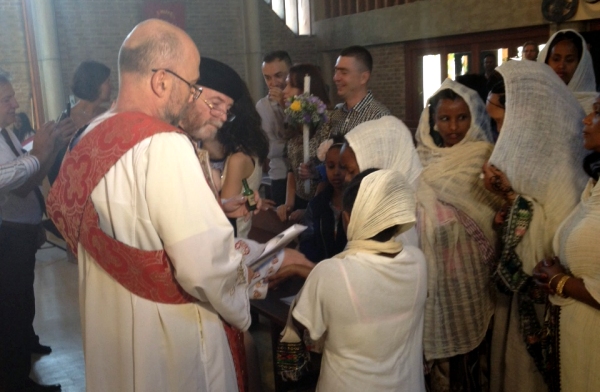
Father Simon Smyth was assisted by Deacons Antony Holland and Daniel (who, together with his wife Janice, had travelled from London for the occasion) and Subdeacon Nicola Popa (who, together with his wife Diana, had travelled from Poole).
Sybil Saunders laid to rest at Babingley
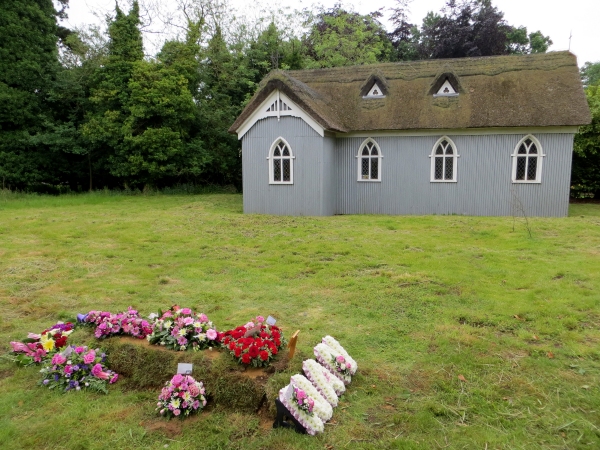
The funeral of Sybil Saunders (1927-2015) took place at the Orthodox Church of St. Mary & St. Felix at Babingley on 5 June in the presence of a large congregation of family, friends and church members. Abba Seraphim officiated, assisted by Deacon Christopher Barnes and Subdeacons Roger-Kenneth Player and Trevor-James Maskery. The weather in Norfolk was warm and sunny with thundery showers, which held off until after the burial. During the service two poems were also read, which had been written by Sybil’s grandchildren and great-grandchildren.
In his address, Abba Seraphim, commenting on the sentiments of these poems, observed that we were already cherishing the precious memories on which our relationship with Sybil was founded. “They are especially poignant in these days following her repose, but they will remain strong and not fade as the years pass because she has an assured place in our hearts and for her family she will always be of the greatest significance. The power of love is profound, strong and enduring and it comes from God. In her life Sybil played many parts: daughter, wife, grandmother, friend, neighbour and in whatever way we knew her, her character was the same: calm, considerate, kind, dignified, self-effacing, stoical, loyal.” He quoted from the description of the god-fearing women in the Book of Proverbs (XXXI: 10-31), which applied so well to Sybil.
Her almost seventy years of marriage to Deacon Mark was a truly blessed partnership of sharing and commitment through good times and bad. “Two different personalities but a wonderful complementarity, each bringing together their gifts for the enriching of the other and the overflowing of their love with family, friends and church. One of the family described them to me as a ‘double act,’ for truly in their love for each other they became one, yet it was not for the selfish satisfaction of either, but to be shared. To her descendants, her 4 children, 6 grandchildren and 9 great-grand children, she left a model of family life: happy, loving, committed and caring in which she nurtured each generation, passing to them her values as surely as she passed on her genetic legacy. From her days in the Land army Sybil learned to work with cows and had a real affinity with animals, especially dogs. Home cooked food, surrounded by children and animals, yet all the time exuding an inner contentment; living her life for others and deriving true pleasure from giving, not taking. These are all rare and cherished values which Sybil had in full and why we are here today to honour her memory and to solemnly take our leave.”
However, Abba Seraphim emphasised that this is not the end. “Funerals are solemn occasions in which we share a sadness because of our parting from someone we love but they do not mark a total severance – the curtains are drawn, the door is shut, but for Christians the hope of a future life together, the renewal of profound relationships and a glorious, brighter future, allows us to temper our sadness with hope. The Scriptures speak of the fact that God created man out of nothingness and breathed into him a living soul. In the Old Testament we see our forefathers struggling to come to terms with mortality and the inevitability of death, speaking of going into the darkness, of lives being like water spilt on the ground which cannot be gathered up again, of going the way of all the earth, of the Valley of the Shadow of Death. Yet as God revealed himself more to His people and they became closer to Him, the mood gradually changes. David the Psalmist declared, God will redeem my soul from the power of the grave: for he shall receive me (Psalm XLIX: 15) and by the time of the Incarnation, The people which sat in darkness saw great light; and to them which sat in the region and shadow of death light is spring up (Matthew IV: 16). Confronted by the death of her brother Lazarus, Martha was able to declare, I know that he shall rise again in the resurrection at the last day. Martha made this declaration of faith to the Lord Jesus Christ, who answered her definitively, “I am the resurrection and the life: he that believeth in me, though he were dead, yet shall he live: and whosever liveth and believeth in me shall never die.”
“Within days the Lord Jesus had demonstrated His power over Death: bruised and beaten unjustly, he suffered an agonising, cruel and painful passion and death – his disciples were scattered, terrified of suffering a similar fate – and to all worldly intent his ministry had ended in humiliation and defeat. On the third day, however, as He promised, he arose from the dead – not as a phantom but as flesh and blood – still bearing the scars of his passion – so that His disciples were also transformed by their encounter with the Risen Christ and the Church was born bearing witness to God’s triumph over death.”
Abba Seraphim concluded by noting that Sybil had died just at the end of the Glorious 50 days of celebration which follow Holy Pascha, when Orthodox still salute one another with the acclamation, “Christ is Risen” – not was risen, although it took place in history, but here and now because He is still the risen Lord and it is in His resurrection that we hope for our own conquest over death.
Following the service, Sybil’s body was buried in the churchyard, being the first Orthodox burial since the church was first used for Orthodox worship.
Repose of Sybil Saunders
On 28 May, Sybil Doreen Saunders (nee Cross), wife of Deacon Mark Saunders, the deacon in charge of St. Felix Church at Babingley, Norfolk, reposed at her home in here ninetieth year after a long period of failing health, bravely borne. Sybil Saunders was one of the founder members of the Babingley congregation and a highly respected and much loved member of the British Orthodox Church. The funeral will be at St. Felix Church on Friday, 5 June at 12.15 pm conducted by Abba Seraphim, assisted by the Babingley clergy.
Meeting of the Holy Synod in Cairo
Abba Seraphim, accompanied by Deacon Daniel, visited Cairo 22-29 May for the annual plenary meeting of the Holy Synod. As usual, they stayed at St. Mark’s Centre in Nasr City, where they were also joined by Shenouda Mamdouh, the BOC’s Egyptian Secretary; Fr., Arsaniuous El Anba Boula; Marina Tina Hammond and her husband, Youhanna Said Hakim Gourguious from Luxor as well as other old friends. Also staying at the Centre was His Grace Bishop Athanasius of the French Coptic Orthodox Church.
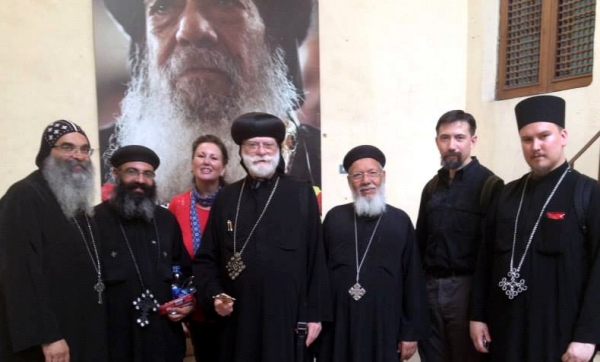
On 23 May they visited Miss Effa at her home in Heliopolis, which now accommodates Coptic girls studying in Cairo. Miss Effa will be 100 in December. In the evening Abba Seraphim was present at Vespers at St. Mark’s Cathedral and participated in the ceremonies preparatory to the episcopal consecration of six bishops elect as well as the elevation of two general bishops to diocesan stratus. Bishop Yoannes El Anba Boula, former Secretary to the late Pope Shenouda has become Bishop of Assuit and Bishop Luka as Bishop of Geneva and Southern France. The six new bishops were 1- Hegomen Monk Bishoy Al-Muharaqi, as His Grace Bishop Boktr, General Bishop of Al Wadi Al Gadeed Diocese;
2- Hegomen Monk Bakhoum Al-Bakhoumi, as His Grace Bishop Youakim, General Bishop of Esna and Armant; 3- Hegomen Monk Ilarion Ava Mina, as His Grace Bishop Ilarion, General Bishop of Ezbet El Haganna, Almaza and Nasr City; 4- Hegomen Monk Iklemandos Ava Mina, as His Grace Bishop Iklemandos, General Bishop of East Canada; 5- Hegomen Monk Apollo Anba Bishoy, as His Grace Bishop Mark, General Bishop of Paris, France; and 6- Hegomen Monk Hermina Al-Baramosi, as His Grace Bishop Hermina, General Bishop of Ain Shams and El Matareya. The following morning Abba Seraphim joined with other members of the Holy Synod at the Divine Liturgy in St. Mark’s Cathedral celebrated by His Holiness Pope Tawadros and in the laying-on of hands of the new bishops. Deacon Daniel Maylon assisted Archdeacon Dr. Rushdi during both services.
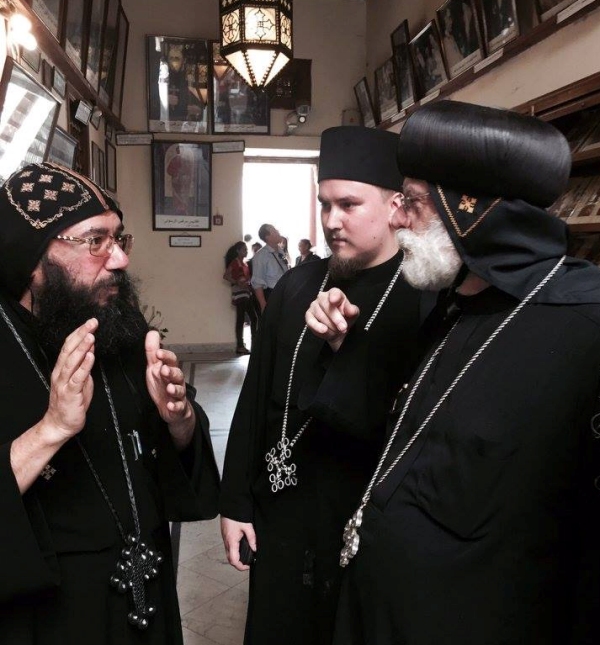
In the evening, after the Liturgy, Abba Seraphim and his part visited some of the churches of Old Cairo to the south of the Fortress: The Church of the Virgin (Babylon al-Darag), known as Babylon of the Steps and the Church of SS. Cyrus and John (Abu Qir wa Yuhanna) and The Church of St. Theodore the Oriental, where they were greeted by Fathers Mina and Youssef. Later they took tea in Al Azhar Park in Cairo. On 25 May they visited Prince Theodore Convent in Haret al Zuela, where they were greeted by the Abbess, Mother Adrosis. Whilst there they met with Father Tadros Samaan of Sydney, whom Abba Seraphim last met when visiting Sydney in 1995. In the evening Abba Seraphim attended the Synodal sub-committee on Ecumenical Relations, chaired by Metropolitan Bishoy of Damiette.
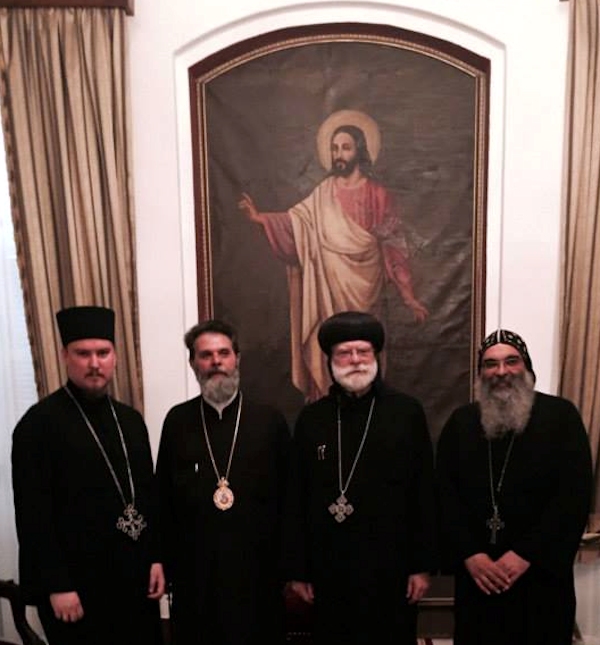
On 26 May Abba Seraphim and his party visited St. George’s Church, Heliopolis, to meet with Father Daoud Lamie. Whilst there they also met with Shenouda Mamdouh’s parents, Mamdouh and Soheir. Following this they travelled to Old Cairo, where they were received by His Grace Bishop Niphon (Tsavaris), Greek Orthodox Bishop of Babylon and afterwards given a private tour of the newly restored portion of the old Fortress of Babylon built beneath the Greek Orthodox Church (Mari Girgis) as well as the museum and burial vault of the Greek Patriarchs of Alexandria. On leaving the Greek Patriarchate they briefly visited the Ben Ezra Synagogue, the Church of SS. Sergius and Bacchus (Abu Sarga) and the Hanging Church (al Mu’allaqa), where they were received by Bishop Julius of Old Cairo. They also visited the Convent of St. George to greet the new Abbess, Mother Thekla. In the evening Abba Seraphim attended two further Synodal Committees, Faith and Education, chaired by His Grace Bishop Moussa and the Lands of Immigration, chaired by His Grace Bishop Serapion.

On 27 May the weather in Cairo reached a record temperature of 45 degrees Celsius (113 Fahrenheit) so Abba Seraphim postponed his planned visit to the western desert whilst his companions decided to visit the Coptic Museum in Old Cairo instead. The Holy Synod met on 28 May at the Coptic Cultural Centre in Anba Rueiss, where H.H. Pope Tawadros II presided over a gathering of 107 bishops out of the total of 123 members of the Holy Synod. The meeting lasted over four hours and was followed by the traditional photograph and lunch and Abba Seraphim took his leave of the Pope and receiving his blessing. That evening Abba Seraphim dined with members of his party and friends at St. Mark’s Centre before returning to London on 29 May.
